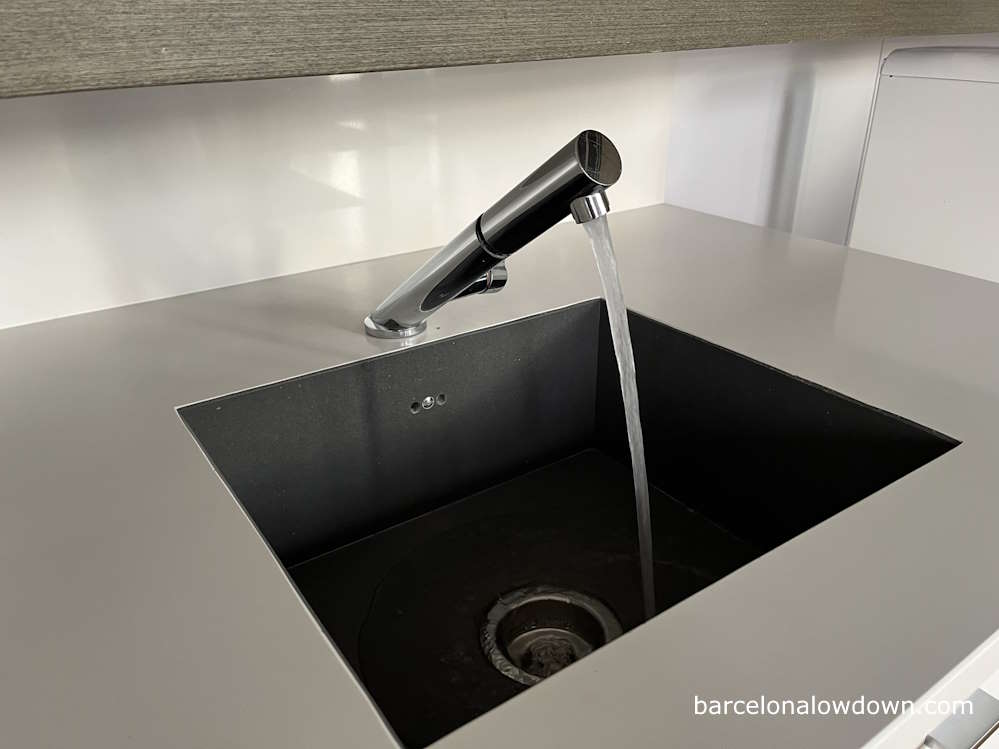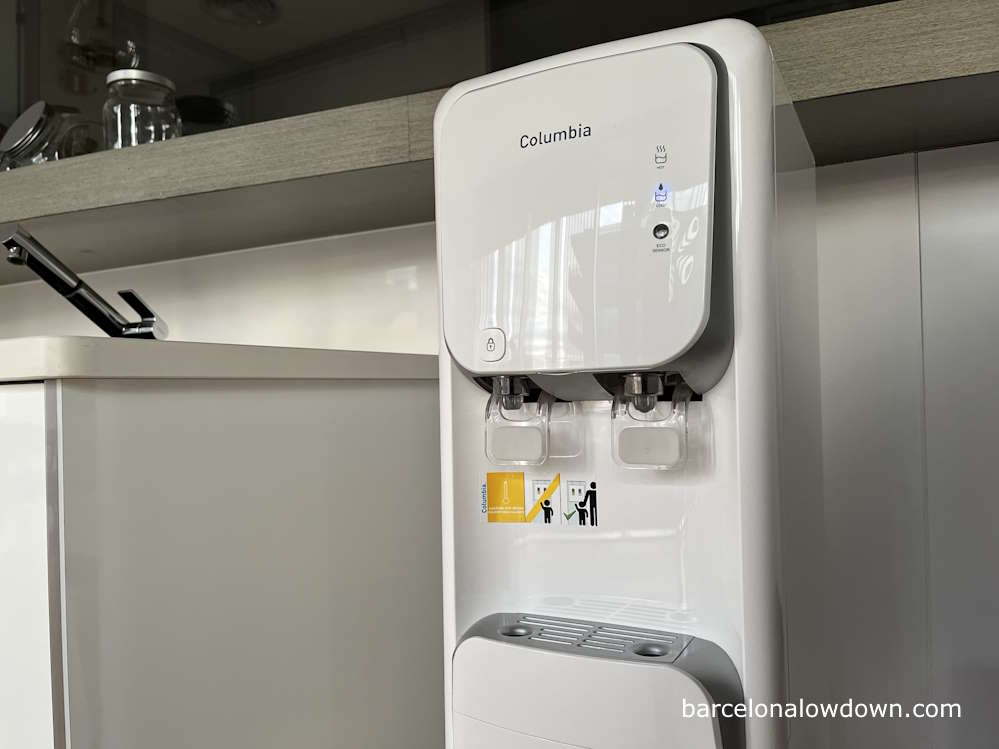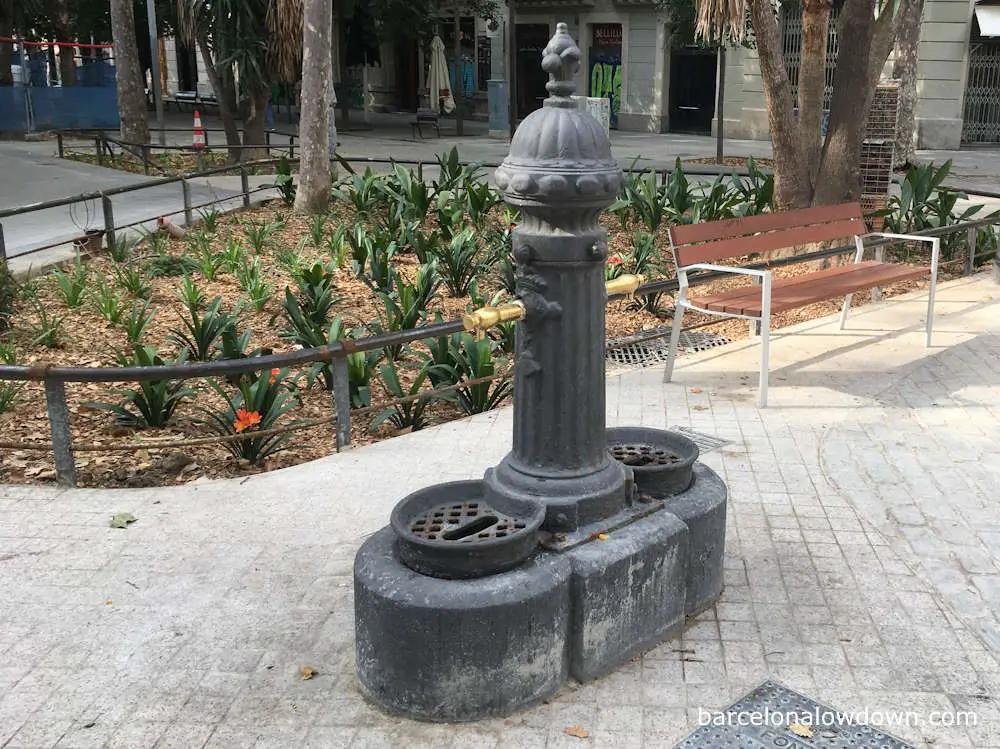If you’re planning a trip to Barcelona you’re probably wondering whether the tap water in Barcelona is safe to drink.
Yes, tap water in Barcelona is completely safe to drink and is continuously monitored to ensure that it meets the standards established in EU directive 2220/184 and under Spanish law, Real Decreto 140/2023. Both these regulations define strict limits that the water must adhere to.
After living in Barcelona for over twenty years, I can confidently say that I have never experienced any health issues from drinking tap water in my home or from public drinking fountains throughout the city.

Water supply and treatment
Tap water in Barcelona comes from three sources: the Llobregat and Ter rivers and a desalination plant built in 2008, although this only produces a very small percentage of the water.
From here, the local water company, Aigües de Barcelona, filters and treats the water before distributing it throughout the city. Throughout the process, the water is repeatedly tested to ensure it is safe to drink.
Tap water in Spain is regulated under both Spanish and EU law and in accordance with recommendations from the World Health Organization. These laws require that the water is tested for a total of fifty-three different parameters, which include different types of bacteria as well as chemicals, heavy metals and other toxins.
The laboratories that perform the test undergo regular audits and are certified under ISO/IEC 17025 and ISO 22000. Aigües de Barcelona claims on its website that the city’s drinking water undergoes more tests and controls than any other foodstuff.
What about taste?
Now that we’ve established that the tap water in Barcelona is safe to drink and undergoes rigorous testing to ensure that it won’t make you sick, it’d be safe to assume that everyone who lives in Barcelona drinks tap water, right? Well, not exactly.
Despite being perfectly safe to drink, tap water in Barcelona doesn’t taste particularly great. This is because Barcelona is in a hard water area, meaning that the water contains a relatively high concentration of minerals, mostly calcium and magnesium. In addition to causing limescale to build up in kettles and cookware, the minerals in the water also increase the perceived taste of chlorine, which is added to the water in small amounts to kill bacteria.
Many of the locals prefer to drink bottled water, which is cheaper than it is in the UK. Some people choose to install under-sink water filters in their homes, although this is relatively uncommon.
Personally speaking, as someone who grew up drinking tap water, I think that the water in Barcelona tastes OK. Admittedly, it does have a slight taste of chlorine, but it’s no worse than tap water back in the UK, and it can be reduced by chilling the water in a glass jug in the fridge before drinking it.

Drinking water in bars and restaurants in Barcelona
Bars and restaurants in Barcelona typically serve bottled water and offer the option to choose between still or carbonated water.
In recent years, as people have become more conscious of the environmental consequences of single-use plastic bottles, an increasing number of restaurants now serve filtered water which is tap water that has been purified on-site to eliminate the chlorine and the unpleasant taste.
Since April 2022, bars and restaurants in Spain have been legally obliged to serve customers tap water free of charge, although most people are unaware of this, and it is unlikely that you will be offered tap water unless you specifically ask for it.
Drinking water from taps and fountains
We all know the importance of staying hydrated, particularly during the summer when the daytime temperatures rise above 25ºC. Fortunately, there are more than 1,600 drinking water fountains available in Barcelona, situated in public spaces such as parks and squares.
Some of these fountains are modern and similar to those you may be accustomed to back home, while others are old-fashioned cast iron fountains with brass taps, like the one shown in the photo below. The water provided by these fountains is sourced from the same system that supplies tap water to people’s homes and is completely safe to drink.

The city council has created an app called Fonts de Barcelona, which can be used by visitors, as well as Barcelona residents, to find the nearest drinking fountain.
Conclusions
Tap water in Barcelona is treated and regularly tested to ensure it is safe to drink. However, due to the relatively high mineral content and mild taste of chorine, many people prefer to drink bottled or filtered water.
The city has more than 1,600 public fountains that provide drinking water and help to reduce plastic waste caused by single-use plastic bottles.
Since 2022, bars and restaurants have been required by law to serve tap water free of charge if their customers request it, although this is a fairly new law, and most people are not yet aware of it.




